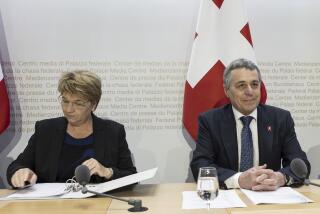EUROPE : Expectations Low for EU’s ‘Constitutional Convention’
- Share via
BRUSSELS — It’s decades late, but early next month in the Sicilian resort city of Messina, Europeans begin what is widely expected to be their first genuinely open, formal debate on a future together.
The occasion is the start of preparations for an intergovernmental conference of the European Union’s 15 member nations set for the second half of next year. The task of the conference is easy to explain: Decide the course of European unity.
Doing it will be far harder.
EU national leaders, many of whom enjoy only the narrowest of governing majorities, must address highly emotional issues that will determine how Europe relates to its members and the outside world.
Issues such as forging a common foreign and security policy, building a joint defense and defining the roles of both the European and national parliaments combine to give the conference the flavor of a constitutional convention.
Many analysts believe that the combination of weak leaders dealing with gut issues at a time when public enthusiasm for European unity has visibly ebbed adds up to a conference that will accomplish little.
Others, however, recall that it was at just such times that some of the most important steps were taken toward closer European unity, including the 1985 Single European Act, which knocked down the final trade barriers among member states, or a 1955 conference in Messina that led directly to the Treaty of Rome establishing the EU’s forerunner, the European Economic Community.
*
“The only lesson we can draw from the past is that you can never say nothing is going to happen at times like this,” said Stanley Crossick, chairman of the Belmont European Policy Center in Brussels.
But there was an important difference on those earlier occasions: Decisions were taken with little public consultation or debate, and even some of those directly involved may not have really understood the enormity of their decisions.
This time, a debate among policy-makers and EU followers has begun to percolate into the public domain.
There is general agreement that in important areas, the existing system does not work.
In foreign policy, the failure of diplomacy in the former Yugoslav federation is widely cited as an example of what happens when EU member nations refuse to pull together in a crisis.
Attempts last year to establish a common EU policy on Ukraine also ended in disarray after an overarching policy document issued by the EU Executive Commission was gradually eroded by member countries, which eventually concluded that a single view was not possible. The confusion lingers.
*
In judicial and internal matters, the level of cooperation among member states is even worse, as prolonged delays in the attempts to establish a European law enforcement agency, Europol, have demonstrated.
The recently implemented Schengen Agreement allowing passport-free travel among several EU nations had to be negotiated outside the EU’s normal framework and still took 10 years to implement.
“These kinds of things are unsalable and must stop,” said Nikolaus G. van der Pas, chief spokesman of the EU commission. “If we’re going to show our citizens that this union is more than a piece of paper, we’ve got to show we can act.”
For the commission, this means more decisions made more quickly from Brussels--”strong action at the European level,” commission President Jacques Santer told reporters this week. The commission’s initial position paper issued this week targeted a variety of issues for consideration, ranging from organized crime, unemployment, drugs and terrorism to the environment, foreign policy and defense.
Predictably, the European Parliament supports greater centralization, while governments of member states that collectively will make the final decisions at the 1996 conference are expected to be far more cautious.
Predictions on the outcome of next year’s conference are difficult because of such unknowns as the fate of Britain’s shaky Conservative government with its influential band of anti-Europeans and the course of newly elected French President Jacques Chirac.
“Some talk about putting their cards on the table,” Crossick said. “But with a year to go, the truth is, all the cards haven’t been dealt yet.”
More to Read
Sign up for Essential California
The most important California stories and recommendations in your inbox every morning.
You may occasionally receive promotional content from the Los Angeles Times.










